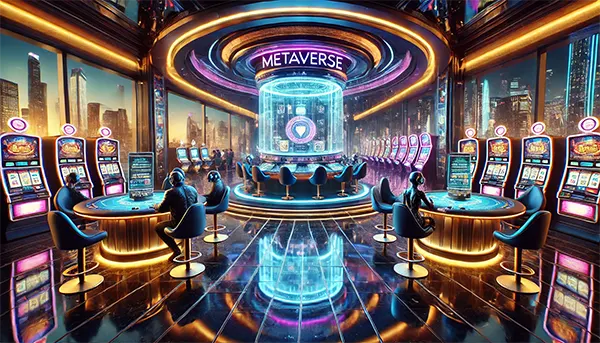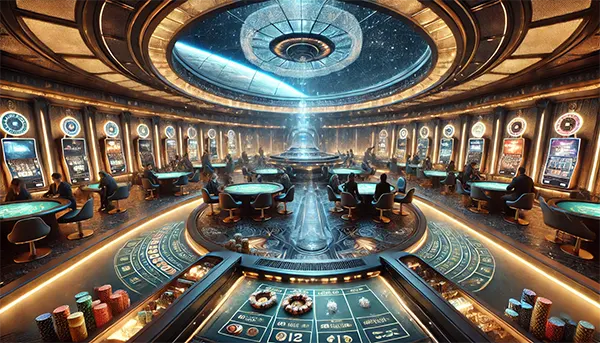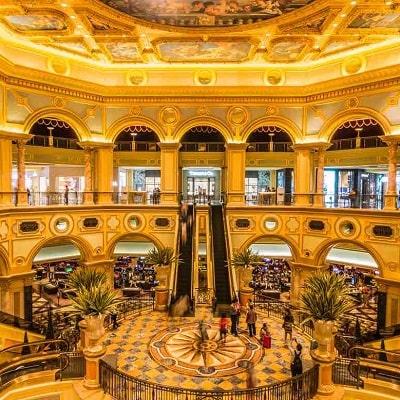Casinos in the Metaverse: What Awaits Players in the Future?

The rapid development of virtual reality and blockchain technologies has significantly influenced online gambling. The metaverse is emerging as a new frontier for the casino industry, offering a unique, immersive experience for players. With the integration of cryptocurrencies, decentralised platforms, and realistic environments, gambling in the metaverse is poised to revolutionise traditional gaming.
How Virtual Reality Transforms Online Casino Experiences
Virtual reality (VR) is at the forefront of innovation in online casinos, enhancing the way players interact with games. Unlike traditional online casinos, where gameplay is limited to screens, VR casinos create immersive environments where players can engage in lifelike gambling experiences.
One of the biggest advantages of VR casinos is the ability to replicate the ambiance of real-world casinos. Players can walk through virtual halls, sit at poker tables, and interact with other participants in real-time. This social aspect adds a new dimension to online gambling, making it more engaging.
Additionally, VR technology allows for advanced personalisation. Players can customise avatars, create private gaming rooms, and even select their preferred casino environments. This level of engagement not only attracts new users but also enhances retention rates among experienced gamblers.
First Metaverse Casinos: Real-World Examples
Several pioneering platforms have already integrated casinos into metaverse ecosystems. For example, Decentraland features a virtual casino district where players can gamble using cryptocurrency. Similarly, The Sandbox has developed interactive gambling experiences powered by blockchain technology.
Another notable example is Somnium Space, which offers VR-enabled gambling venues. Players can enter these virtual casinos, engage in games, and experience a highly interactive betting environment. These platforms are setting the stage for the future of online gambling by blending decentralised finance with digital entertainment.
As metaverse casinos continue to grow, major gambling operators are beginning to explore partnerships in this space. Some traditional online casinos are already testing VR integration, bridging the gap between standard online gaming and fully immersive metaverse experiences.
How Cryptocurrency Casinos Operate in the Metaverse
The integration of cryptocurrency within metaverse casinos eliminates many of the barriers associated with traditional online gambling. Blockchain technology ensures transparency, fairness, and security, providing players with greater trust in digital transactions.
Smart contracts play a crucial role in automating transactions in metaverse casinos. These self-executing agreements enable instant deposits, withdrawals, and fair gaming mechanisms without the need for intermediaries. As a result, players can enjoy seamless transactions and decentralised betting.
Furthermore, metaverse casinos often utilise NFTs (non-fungible tokens) to offer exclusive perks and rewards. Some platforms provide NFT-based access to VIP rooms, unique avatars, or customisable casino assets. This adds a layer of exclusivity and investment potential to the gambling experience.
Advantages and Risks of the New Era of Gambling
While the metaverse presents numerous opportunities for the gambling industry, it also introduces new risks. One of the most significant advantages is the enhanced user experience, where players can engage in realistic casino settings from anywhere in the world. The removal of geographical barriers makes gambling more accessible to a global audience.
Additionally, the integration of blockchain technology ensures greater security and transparency. Players have verifiable proof of fair play, and smart contracts remove the need for centralised authority, reducing the risk of fraud.
However, concerns surrounding regulation and responsible gambling remain prominent. The anonymity of crypto-based gambling raises questions about underage participation and addiction risks. Furthermore, the decentralised nature of metaverse casinos complicates regulatory oversight, potentially leading to unregulated gambling practices.

Future Prospects of Casinos in the Metaverse
As technology evolves, metaverse casinos are expected to become more advanced, incorporating artificial intelligence (AI) and machine learning to enhance user experiences. AI-driven dealers, personalised game recommendations, and predictive analytics will play a vital role in shaping future gambling platforms.
Moreover, as VR hardware becomes more affordable, the adoption rate of metaverse casinos is likely to increase. With tech giants investing heavily in VR development, mass-market accessibility is only a matter of time. This will lead to more immersive, interactive, and engaging gambling environments.
Collaboration between gambling operators, blockchain developers, and regulatory bodies will be key to ensuring a secure and fair metaverse gambling ecosystem. Responsible gambling measures must be integrated into these platforms to provide players with tools for self-regulation.
The Role of AI and Blockchain in Metaverse Gambling
AI-powered algorithms will enable metaverse casinos to offer tailored gaming experiences based on user behaviour. From identifying betting patterns to recommending personalised game selections, AI will significantly improve player satisfaction.
Additionally, blockchain technology will continue to enhance security and transparency. Decentralised autonomous organisations (DAOs) may govern some metaverse casinos, allowing for community-driven decision-making and fair operational standards.
With continued innovation and regulatory advancements, the future of gambling in the metaverse holds immense potential. As adoption increases, metaverse casinos will redefine the industry, offering players unparalleled experiences in a decentralised, virtual world.





